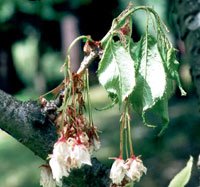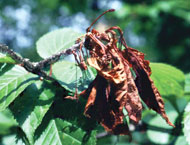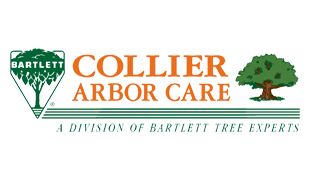|

Diseased flowers wilt, turn brown and are covered with masses of spores. Brown Rot Blossom BlightDownload a PDF of this articleDescriptionBrown rot blossom blight is a common and destructive disease of all stone fruits including flowering cherry and plum as well as their fruit bearing relatives. Plants AffectedFlowering and weeping cherry, flowering plum, fruit trees; apricot, cherry, peach, and plum. Symptoms/DamageThe brown rot fungus can attack blossoms, fruit, leaves, twigs and branches. Disease symptoms appear in the spring after the blossoms open. Diseased flowers wilt, turn brown and are covered with masses of spores. The disease spreads into twigs causing small branch dieback. Profuse gumming may appear on infected branches. Fruit infections appear as soft brown spots and can engulf the whole fruit. Infected fruit and flowers shrink into "mummies" and may persist on the tree until next year. Life CycleBrown rot is caused by a fungus that over winters on infected plant parts. In the spring during wet weather masses of spores are produced that can infect the blossoms and young shoots. The disease will continue infection cycles during wet periods in the spring. ManagementA combination of cultural methods and treatments are needed to control this disease in our wet rainy northwest climate. CulturalSanitation is very important. Remove and destroy all infected twigs and branches. Remove all rotted fruit. Remove wild or neglected stone fruit trees that serve as disease reservoirs. Avoid wounding fruit during harvest. OrganicUse wettable sulfur or copper during periods of wet weather. See below for schedule. ChemicalApply three to four treatments of an approved fungicide (some are systemic) starting at bud break in the early spring and continue at regular intervals during the spring until dry weather. Thoroughly treat all leaf and twig surfaces. Treatments during blossoming are essential for good control. The wetter and rainier the spring, the worse the disease problem is. Also apply a dormant treatment before fall rains. |

Leaf, bud and stem dieback occurs. |
|
Home |
Services |
The Arbor Advisor |
Garden Calendar |
About Us |
Fact Sheets |
Contact Us |
Site Map Collier Arbor Care Portland 503-722-7267 Vancouver (360) 693-6056 Site contents and design ©2013 Collier Arbor Care |





